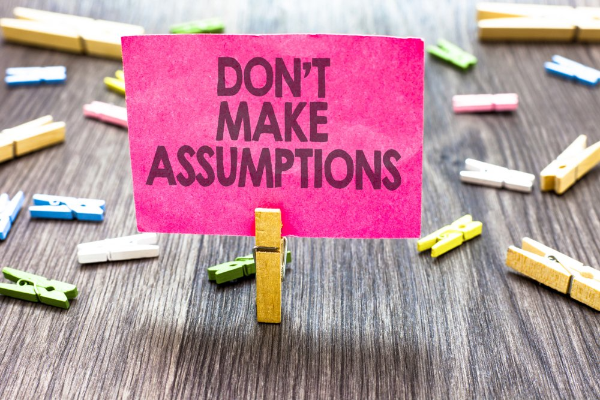
18 ways you screw up placements
The biggest cause of placements going wrong is the recruiter making assumptions.
Flawed assumptions – as they most often are.
We think we don’t. But we do.
Strangely enough, experienced recruiters are often most guilty.
“Seen this before” they mumble. But they haven’t. This is different
And you won’t find out this situation is different until it is too late. Because you don’t dig. Ask. Explore. Test. Question. Listen. Ask again.
Information drives success in recruitment. And the ‘information’ is fluid and dynamic. That is why our industry will not be replaced by AI any time soon.
Sometimes, just the tone of a candidate’s voice as they say ‘yes’ tells a sophisticated recruiter that it’s actually a ‘no’ or a ‘maybe’.
AI will, however, lead to the demise of many recruiters because they make assumptions and lack highly evolved human influencing skills.
The craft of managing the process still determines whether a candidate is offered and, crucially, accepts a job.
Successful recruitment is not all about ‘sourcing’. It is about matching too, sure. And then, crucially, managing each step of the process, usually by finessing the attitude of both the client and candidate. For the greater good, I might add.
So next time your ‘dead cert’ placement goes belly-up, resulting in tears all around, don’t blame the candidate, the client or ‘bad luck’. It’s almost certainly your fault because you assumed something that is not the case at all.
One of these, probably.
1. You assume your client actually has the authority to hire. Often, they don’t. Check that early in the process. Has this hire been authorised? Given sign-off? Are we good to go?
2. You assume your client actually knows what they really need in their next hire. Often, the client sets out simply to hire someone with the same skill set and profile as the person who just left. Meanwhile, the business and the role have changed, and the skills required have changed. You need to ask the questions that expose that, because if you don’t, you will spend time looking for the wrong person. And the client will only realise that late in the process. And then, they will change the brief and ask you to start again. And probably blame you. Sound familiar?
3. You assume the client you take the role from is the decision-maker on who gets the job – or even an interview. Often not the case. Who gives the final nod? The line manager? HR? The line manager’s manager? The CEO?
4. You assume your client is only briefing you on this role. Yeah, right! You have to ask the question! And you need to try to get that exclusivity, which is a real recruiter skill that so few seem to have now.
5. You assume that the ‘critical’ skills, qualifications and experience that the client described in the brief as ‘essential’ are indeed “must haves”. They rarely are. Usually there are just 2 or 3 total deal-breakers. You have to dig until you find out what they are. A client will forgive many missing skills and experience if your candidate has the two key things they really want. Qualifying the job order is a key recruiter skill.
6. You assume your clients’ ‘top salary package’ for this role really is the ceiling. It almost never is. You have to find that out before you start your talent search.
7. You assume your client is not considering internal candidates. They likely are.
8. You assume the client is better placed than you to devise a recruiting strategy for their company. Or worse you know they are wrong, but you let it slide because ‘they are the client’. The power of consultative pushback is your friend – and your insights and advice are in the client’s best interest.
9. You assume that the reasons the candidate gave you for changing jobs and their list of ‘must haves’ in their new role are accurate. It rarely is at first run. You must understand the real ‘MTA’.
10. You assume your candidates are as interested in the role as they tell you they are. You also believe them when they say they are not looking at other roles, and they will not accept a counteroffer ‘under any circumstances’. The truth is that these things may well have been true when the candidate said them to you. But then ‘another agency called and…’. It’s a case of constant calibration and checking in.
11. You assume your candidate knows how to sell herself in an interview, knows how to highlight why she is suitable for the role, and won’t do dumb things like bring up money and benefits in the first five minutes. You have to coach your candidates how to interview well. Even role-playing questions and answers. Too hard? Well, prepare yourself for many disappointments then.
12. You assume your client knows how to interview and sell their company and their job. They usually don’t. Subtly, via feedback, suggestion and sometimes outright counselling, you need to make sure your client knows that they are being assessed too – and need to ‘perform’ or miss out on the top talent.
13. You assume your candidate is as fixed on their ‘salary floor’ as they tell you they are. Sure. And that’s why a better recruiter than you will ‘sell’ the opportunity better than you do and get the candidate you overlooked because they ‘wanted too much money’, to go for an interview, get the job, and accept it at 10 grand lower than they told you they would ever accept! This will help you avoid that mistake.
14. You assume that your ‘candidate update’ conversation about salary, other jobs and interest in your job is still valid 12 hours later. Its quite likely not. The question ‘Has anything changed since we last spoke?’ is your very best friend
15. You assume your successful candidate knows how to resign and has the confidence to do that without succumbing to emotional or financial blackmail from their current employer. You have to manage that, prepare them for the resignation meeting, and follow up immediately.
16. You assume that an offer, once accepted, is a done deal. It’s not. You have to keep in touch between acceptance and start date, every day if you must. There is many a slip between acceptance and the candidate actually turning up on day one. It’s the dreaded ‘Valley of Death’ and its yours to manage
17. You assume your client will do a good job with the new hire’s induction. You must be in touch with both parties often after the start, smooth over difficulties, and manage feedback from and to both parties. This is crucial. Many an early fallout can be saved.
18. You assume the candidate is making decisions on his or her own. Often wrong. The spouse or significant other or even parent, is often hugely influential and sometimes actually driving the decision. Ask, “What do the people close to you think about you making this move”. If it’s a senior role, and maybe a geographical move, get the spouse involved. I have had the spouse meet the client before. Seriously. It worked too. If I had all the fees back that I have lost because of a spouse getting cold feet… I would be retired by now! (Oh, I am kind of retired)
Assumptions. Lack of knowledge. Overconfidence. Lack of attention to detail. Missing the signals. Not asking the key questions. Complacency. Hubris. Naivety. Ignorance. Lack of training!
All poison to your next placement.
Never assume anything in this business.
Assumptions in recruitment will bite you in the butt.
Hard.
And it hurts!
*****************************************************************************************************************************************
Waiting for the market to fix your results is not smart
Better skills, smarter tactics, and new ideas are the way to thrive in any market
Train your recruiters now with the best new recruitment learning tool on the market

Review the SRA contents summary.
Compare subscriptions
***********************************************************************************************************************************************************
- Posted by Greg Savage
- On March 24, 2025
- 0 Comment


